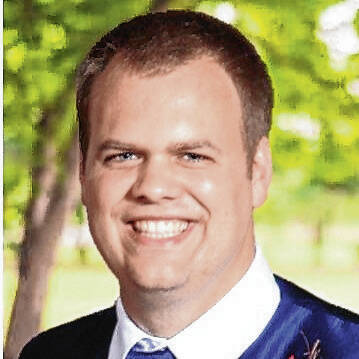Two candidates for Bartholomew Consolidated School Board have expressed concern regarding a survey given to BCSC students that included, at the high school level, a question regarding sexuality and gender.
On the week of Sept. 6, BCSC students in grades four through high school were given the option to participate in a survey from the Search Institute titled “Resilience Through Strengths.”
Eric Grow, who is running for the board’s District 4 seat, voiced concern at Monday’s board meeting about how the survey might normalize “subjective truths” and be used to forward certain agendas.
District 6 candidate Logan Schulz shared on social media that he felt there should have been more communication and transparency regarding the survey.
The survey is part of a larger project known as the “Resilience Through Strengths” community pilot. In January 2021, the Council for Youth Development Bartholomew County, the Indiana Department of Education and local school officials announced that Bartholomew County would be a pilot in international efforts to study and enhance youth development.
The county joined an international research team led by the International School Psychology Association, the International Institute for Child Rights and Development, the Search Institute, IUPUI’s School of Education and the Indiana Department of Education. Local leaders are working with the team to study whether asset-based practices “reduce the effects of childhood trauma and improve youth resiliency.”
BCSC Director of Secondary Instruction Bill Jensen said in a previous interview that asset development focuses on building upon students’ “strengths and passions.”
“You’re really building upon strengths and giving students more assets so that they can be more resilient to adverse experiences,” he explained. He added that this will also help prepare students for when they face challenges in adulthood as well.
Council For Youth Development (CYD) Director Heather Carson said that the student survey would be heavily based on the Search Institute’s Developmental Relationships Survey.
“Once the survey report is completed, stakeholders including youth, families, and community partners will be invited to work together to address needs and explore new strategies to ensure all Bartholomew County youth thrive,” CYD’s website states.
The organization also wrote that survey included questions on assets, relationships, outcomes, academic motivation, “experiences of bias and belonging,” and the effects of COVID-19.
“Questions regarding Adverse Childhood Experiences will only be available for students 18 or older to voluntarily complete,” the organization added.
BCSC Director of Wellness Kristin Beck said that the survey was created by Search Institute and partner organizations.
“This was a survey to get youth voice on how they are doing,” she said. “So there were questions that were in regards to assets or strengths they feel that they possess. There were questions regarding the impact of COVID-19 and how that may have impacted their overall wellbeing. And there were questions just about their experiences.”
She also said that, in some cases, the questions for elementary and middle schoolers varied from those presented to high schoolers.
At the high school level, there was a question that allowed students to indicate how they identify in terms of gender and sexual orientation. This question was not in the survey given to younger students.
BCSC sent out a letter to parents prior to the survey, explaining the goal of the project and that participation was wholly optional and anonymous. The survey was to be administered from Sept. 7 to 9 to students in grades four through 12.
“You may refuse participation on behalf of your child and your child can skip items if they so choose and end their participation at any time,” said school officials. A refusal form was included with the letter.
The letter also stated that the survey would contain questions about students’ experiences, ideas, and personal information such as gender and race/ethnicity.
According to Beck, parents were notified through a district newsletter via ParentSquare on Aug. 19, as well as hard copies of the letter that were sent home with all students in grades four through 12 on the week of Aug. 22.
There was also a hard copy of the survey available at each school’s main office for parents to review, but digital copies were not shared “for the integrity of the survey.”
“In addition, there was a script that was read before the survey was administered, and it reiterated to students that it was an optional survey,” said Beck. “So even if a parent or guardian had not completed the opt-out form but the student didn’t want to participate, they had that opportunity. They did not have to participate.”
Flat Rock-Hawcreek School Corp. is also involved with the Resilience Through Strengths project, and its students took a survey during the same week as BCSC.
On Sept. 18, Schulz shared on social media that his campaign had received multiple inquiries from community members regarding the survey. His post included a copy of the letter to parents and his personal position on the subject.
In providing details he’d received about the survey outside of the letter, Schulz wrote that it was “likely tied to federal COVID funding received prior with a multi-state rollout, however could not confirm.” He also noted that he had heard from parents who were concerned because the high school version of the survey “asked deeper details like the question around sexual orientation.”
Schulz then wrote that if he were on the board, he would have sought to take the following actions regarding the survey: give an option to review the survey online via ParentSquare, make it opt in instead of opt out due to potentially controversial topics (or at least provide an opt out option online), and be more specific about content that parents would find concerning, such as sexual orientation.
He also wrote that there should have been corporation-wide communication via ParentSquare for fourth to 12th grade parents and not just letters sent home. He did not address that BCSC had actually shared the information on ParentSquare as well as the printed letters.
“I see this as another missed opportunity to regain trust between the community and the school board,” said Schulz.
Grow also expressed concerns about the survey at the school board’s Sept. 26 meeting during the time for public comment. He noted that the letter to parents had stated, “Other than some possible discomfort with some questions where students will reflect on their personal experiences, there are no risks to participating in this study.”
“To the contrary, there is an argument that the survey, in one small part of a whole, in normalizing subjective truths that many in are community believe are in conflict with their objective truth,” said Grow. “There’s also the possibility that the results of the survey may be used to push future agendas that would also hold risks.”
Like Schulz, he said that parents should have had more access to information about the survey.
He added that while he understands the importance of assessing students’ mental health and the need to categorize results based on gender and sexual orientation, “A discussion should be had over whether being able to identify differences in data based off of those factors is worth the degradation of objective truths for much of our community.”





